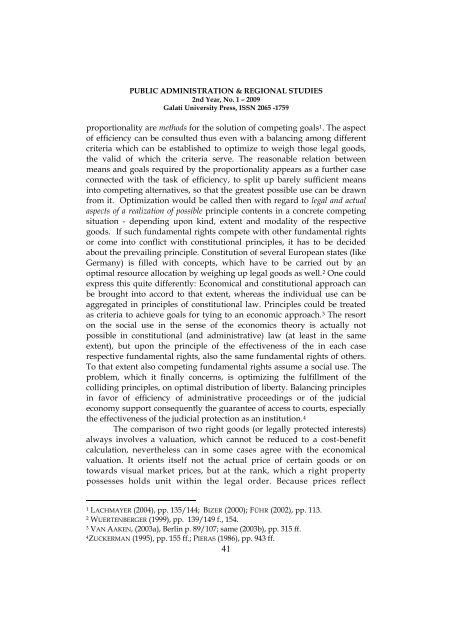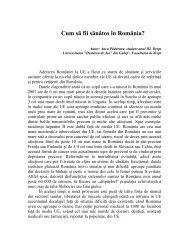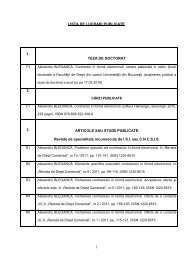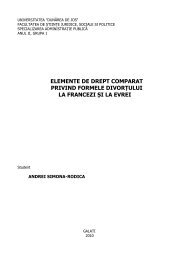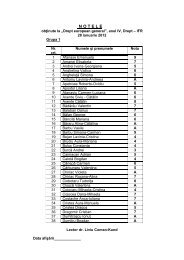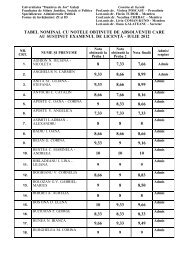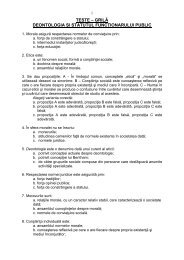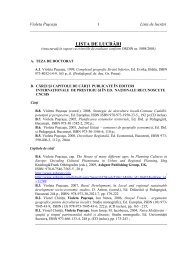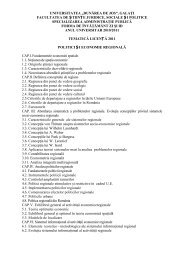regional studies public administration - Facultatea de Drept ...
regional studies public administration - Facultatea de Drept ...
regional studies public administration - Facultatea de Drept ...
You also want an ePaper? Increase the reach of your titles
YUMPU automatically turns print PDFs into web optimized ePapers that Google loves.
PUBLIC ADMINISTRATION & REGIONAL STUDIES<br />
2nd Year, No. 1 – 2009<br />
Galati University Press, ISSN 2065 -1759<br />
proportionality are methods for the solution of competing goals 1 . The aspect<br />
of efficiency can be consulted thus even with a balancing among different<br />
criteria which can be established to optimize to weigh those legal goods,<br />
the valid of which the criteria serve. The reasonable relation between<br />
means and goals required by the proportionality appears as a further case<br />
connected with the task of efficiency, to split up barely sufficient means<br />
into competing alternatives, so that the greatest possible use can be drawn<br />
from it. Optimization would be called then with regard to legal and actual<br />
aspects of a realization of possible principle contents in a concrete competing<br />
situation - <strong>de</strong>pending upon kind, extent and modality of the respective<br />
goods. If such fundamental rights compete with other fundamental rights<br />
or come into conflict with constitutional principles, it has to be <strong>de</strong>ci<strong>de</strong>d<br />
about the prevailing principle. Constitution of several European states (like<br />
Germany) is filled with concepts, which have to be carried out by an<br />
optimal resource allocation by weighing up legal goods as well. 2 One could<br />
express this quite differently: Economical and constitutional approach can<br />
be brought into accord to that extent, whereas the individual use can be<br />
aggregated in principles of constitutional law. Principles could be treated<br />
as criteria to achieve goals for tying to an economic approach. 3 The resort<br />
on the social use in the sense of the economics theory is actually not<br />
possible in constitutional (and administrative) law (at least in the same<br />
extent), but upon the principle of the effectiveness of the in each case<br />
respective fundamental rights, also the same fundamental rights of others.<br />
To that extent also competing fundamental rights assume a social use. The<br />
problem, which it finally concerns, is optimizing the fulfillment of the<br />
colliding principles, on optimal distribution of liberty. Balancing principles<br />
in favor of efficiency of administrative proceedings or of the judicial<br />
economy support consequently the guarantee of access to courts, especially<br />
the effectiveness of the judicial protection as an institution. 4<br />
The comparison of two right goods (or legally protected interests)<br />
always involves a valuation, which cannot be reduced to a cost-benefit<br />
calculation, nevertheless can in some cases agree with the economical<br />
valuation. It orients itself not the actual price of certain goods or on<br />
towards visual market prices, but at the rank, which a right property<br />
possesses holds unit within the legal or<strong>de</strong>r. Because prices reflect<br />
1 LACHMAYER (2004), pp. 135/144; BIZER (2000); FÜHR (2002), pp. 113.<br />
2 WUERTENBERGER (1999), pp. 139/149 f., 154.<br />
3 VAN AAKEN, (2003a), Berlin p. 89/107; same (2003b), pp. 315 ff.<br />
4 ZUCKERMAN (1995), pp. 155 ff.; PIERAS (1986), pp. 943 ff.<br />
41


